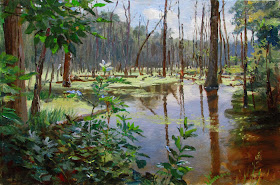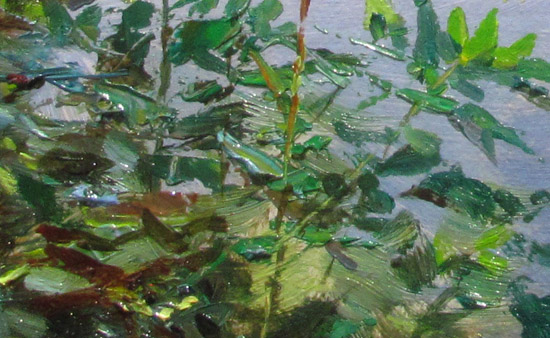Last Sunday I did a painting on the banks of Snyder Swamp.
(Video link) I made this ultra-short video to show a palette knife technique for suggesting foliage.

Here's the finished painting. I’m experimenting with creating ultra-short videos lasting between one and two minutes—little "You Are There" moments. My eventual goal is to use them in an enhanced iPad iBook about plein-air painting.

Here's a detail of the painting, about the size of a business card. You can see how some of the strokes are laid on thickly and are "partial mixtures," —that is, composed of various colors within the stroke.
Meanwhile, I’m putting the finishing touches on the edit of the hour-long dinosaur painting video. More on that as it comes together.
---------
See my other videos or subscribe to the GurneyJourney YouTube channel.
Read about the four colors in foliage in my book "Color and Light: A Guide for the Realist Painter."

You are always my inspiration,
ReplyDeletegreat work..!!
Excellent idea (the iBook). That's one I would buy.
ReplyDeleteI got your book on light and color -excellent material- but there is no substitute for seeing the strokes as they are made.
Short yet informative. The foliage looks very convincing: I suspect the trick is to "suggest" the shape and texture with some precise detail, and let the brain do the rest (but the choice of colors is critical, too).
ReplyDeleteForeigners like me greatly appreciate that you speak slowly and very clearly.
Needs more dinosaur
ReplyDeleteI like the idea of the iBook. Any updates on the watercolor pencil sketching tutorial/video?
ReplyDeleteThere was show on ticks and Lyme disease on the radio the other day.
ReplyDeleteIt's spreading all over the place and is now found as far North as Manitoba, Canada. I've pulled a few ticks of me in recent years and I've been lucky so far in terms of being bitten by an infected tick.
From what I gather from talking to other painters is that some do take care while others are more cavalier about what seems to me is becoming a huge problem. I use to paint a lot in Vermont and you never even had to worry about ticks. Now you do all over the state.
I was wondering if this is something you worry about when you paint outside.
Wonderful painting by the way.
Love the blue/violets and grays.
Wonderful painting. Were you very liberal with the hues, or were you painting (as best you could) what you saw? The jpg of the final painting shows quite a different scheme from the shot at the first second or two in the video.
ReplyDeleteLovely water!
ReplyDeleteLooks like the lake where my parents live back in Louisiana. Nice Painting! Looking forward to seeing more.
ReplyDeleteThanks, All! Glad you're enjoying the videos. I really like making them.
ReplyDeleteAnon, I'm working on a bunch of videos and digital books at once, as well as other paintings, and they're all coming along gradually.
Jeff, you're right: Lyme disease from ticks is a real concern around here. I've had friends who have had bad cases. I don't like to use Deet, but I spray a little on my socks when I'm sitting outdoors sketching.
Jofeshenry and Mario, I always try to capture the colors as I see them, maybe just enhance them a tiny bit. I'm always astounded how differently my camera interprets colors. In the case the camera only seemed to capture a yellow green, and a dark green, but there were all sorts of blue greens, gray greens, and orange greens in the scene.
Thanks, Jon and Keith -- it was the water that attracted me. This same scene is also really interesting in the winter. I think there are similar swamps or wetlands all over the east coast of the US and I don't know why more people don't paint them. They're magical places.
Probaby because of the bugs. All it needs now are some dinosaurs, and some giant prehistoric wood louse perhaps! :)
ReplyDeleteYeah, it's the littlest creatures that will kill you. I did see a weird shadow on the duckweed that looked like a pteranodon, but when I looked up at the top of a dead tree, it was a great blue heron stretching its wings.
ReplyDeleteIn essence, it seems "switchin' from the larger brush to the finer brush" is already a good recipe.
ReplyDeleteAs an amateur I'm inclined to start with a finer one:-)
Best would be:
I start with a broom...
This is one of my favorite videos that I've seen online, and it's only 1:30! You should definitely make the iBook (hopefully it's downloadable for us without ipads?)
ReplyDeleteIs that generally how you handle foliage; even for distant trees and such? I don't know if you used a similar technique for the foliage in the middle ground and across the swamp?
I just started plein air painting recently, and was wondering how experienced plein air painters simplify foliage, sky holes, etc. So it's very interesting to watch you do this!
Thanks!
I get a sense of some reds being "smuggled" in this painting to good effect.
ReplyDeleteI too, look forward to whatever kind of eBook, video, etc. you put out.
This comment has been removed by the author.
ReplyDeletePlease Mr Gurney - consider filling Bob Ross' shoes. Your blog is great, but you could do so much with a show! I know it.
ReplyDeleteThanks, Kava. I don't know about his shoes, but I'll take his hair.
ReplyDeleteYes, with hair like this almost a broom might be equipped:-)
ReplyDelete